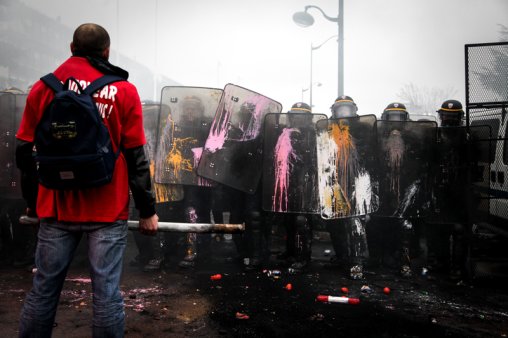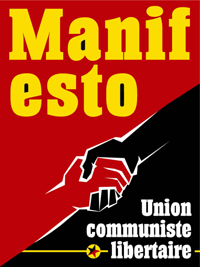 A Driving Force : the Class Struggle
A Driving Force : the Class Struggle
Class struggle is the heart of our revolutionary struggle. It is both the bearer of partial transformations opposed to the logic and interests of the dominant, and of a revolutionary rupture laying the foundations of a new society.
We assert that the division of society in antagonistic social classes remains the prevailing mark of modern capitalism. Capitalism has undergone profound changes, it has never stopped and will never stop transforming itself, through a cycle of crises and expansions. But nevertheless it is first and always based on relations of domination — the ruling and the ruled — with their corollary : the exploitation of manual or intellectual workers by the ruling classes.
A modern conception of the proletariat
Social classes are determined by their place within relations of power and in production—be it the production of material goods, of merchandise, of equipments, or the production of services—in the private as in the public sectors. The class struggle opposes mostly the capitalist class and the modern proletariat. The capitalist class is made of the owners and managers of the means of production, those categories which organize production and snatch the surplus value that they share among them. The modern proletariat comprises all the social groups who, because they are deprived of all ownership or possession of the means of production, are obliged to sell their work force (for manual and/or intellectual work), most of them as wage worker, without any real power of decision over the production.
Between the capitalist class and the proletariat, new intermediate strata of waged workers have developed (executives, engineers, technicians...) who fulfil tasks of control and management. The importance of these strata, politically but also culturally, is ever increasing. To engage the class struggle presupposes a distinction between social classes, between those who issue orders purely for technical or professional reasons, and those who take part in decision-making regarding the goal of the production.
One part of the independent workers oscillates, from a material and ideological point of view, between the upper classes and the popular classes, depending on the capital they own (social, cultural and economic), on the income made with their activity and on their working conditions. Unwaged workers working in the agricultural, the building or the health sector in particular — most of whom suffer from being exploited by this system of domination — still make up an important social category, owing to the purpose of their work as much as to their place in the natural and social environment.
The recent mutations of capitalism in the wealthiest societies have diversified and atomized the proletariat in spite of its significant place in society, thereby increasing the difficulty to build and transmit class consciousness. The speeding up of the class struggle waged by the capitalist class results in plunging on the long term an increasingly larger part of workers into unemployment or precariousness. Some new forms of exploitation at work are developing apart from the wage system, like self-employment or independent contracting which allows large corporate firms, sometimes through digital platforms, to hire underpaid workers who are falsely called « independent », without granting them legal or social protection.
The resort to subcontracting which characterizes today’s capitalism, with sometimes several levels of subcontracting, dilutes managerial responsibilities and the proletariat is thereby all the more divided between the subcontractors and those who are granted a status.
For an inclusive approach
In spite of common conditions and life experience, the proletariat is not a uniform social class. It is permeated with other systems of domination which subdivide it into distinct social groups. The working conditions, the remuneration, or the possibilities to find a job vary according to qualification, but also sex, gender, handicap, skin colour, capacities, language(s) spoken, origin, sexual orientation, nationality, real or presumed religion...Women, LGBTI individuals and racialized people generally suffer from an increased and multifaceted exploitation.
Capitalism takes advantage of these divisions to set these different fractions of the proletariat in competition with one another. The struggles for professional equality between men and women, against racist or LGBTIphobic discriminations on the work place, or for the rights of undocumented workers are therefore an integral part of the class struggle. Likewise, people with disabilities find themselves particularly discriminated against and marginalized. Their specific needs are ignored by capitalism and normative institutions which see them as additional « costs », which makes their full and complete integration in society difficult, or even impossible. This is why we support their struggles for equal rights and equal living conditions. Added to that — and indeed an integral part of the class struggle — is the struggle against hierarchy, which aims to abolish the opposition between manager and operator at work.
A significant role to play
A view limited to a minority working class that would serve as sociological vanguard and sole training force is an outdated view which takes into account only the capitalist domination and which denies the other forms of oppression.
This new proletariat is polymorphous but can be unified on the basis of its shared situation as a victim of domination and exploitation ; it must seek the convergence of protest movements and anticapitalist movements with large sections of intermediate layers of wage workers and with the other social categories dominated by capitalism. Such convergence will be built through social struggles, collective awareness and the emergence of new projects to transform society.
Today it is up to us, revolutionaries, to reinforce the inclusiveness of struggles. We must stop talking and struggling with only one particular constituent of the proletariat. Proletariat is multifaceted, and so must be our demands. By adding to our anticapitalist vision an antipatriarchal and antiracist vision, we will reinforce the revolutionary side, we will fight together for the entirety of proletarians. This convergence will be built through social struggles, through individual and collective awareness and through the emergence of new projects of transformation of society.
The class struggle is at the heart of our revolutionary fight. It will bring us at the same time some partial transformations (on work, the sharing of riches, rights, institutions...) which are opposed to the logic and the interests of the dominant class, and a revolutionary rupture that will lay the foundations of a new society capable of emancipating the whole of mankind. The proletariat, because of its place in the relations of domination and production, will have a central role to play in the break with capitalism and the setting up of self-management.








